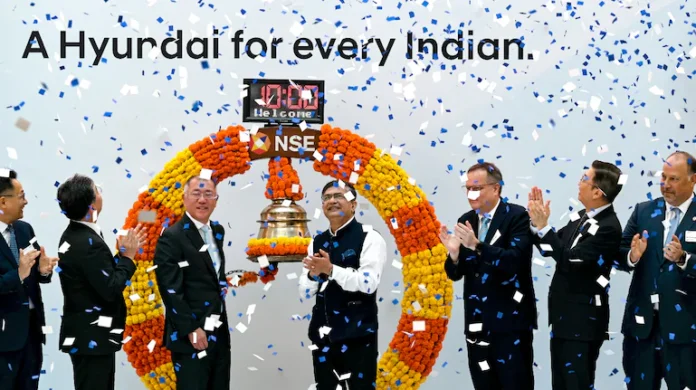The Indian stock market recently witnessed a much-anticipated event—the listing of Hyundai Motor India. However, what many expected to be a robust performance turned out to be lackluster, with the stock price opening below market expectations. Amid concerns over the weak debut, Hyundai Motor India’s COO, Tarun Garg, responded to the situation, stating that the stock price will ultimately be determined by investors, reflecting market dynamics rather than immediate performance.
A Disappointing Stock Market Debut
Hyundai Motor India’s listing on the Indian stock exchanges was one of the most awaited events in the auto sector. Investors and industry experts had high hopes for the company’s market entry, given Hyundai’s strong position in the Indian automobile industry. Hyundai, the second-largest carmaker in India, is known for its popular models such as the Creta, Venue, and i20, which have a strong presence in both urban and rural markets.
However, despite the company’s dominance and solid track record, the stock opened to a weak performance. The initial public offering (IPO) was priced conservatively, yet the stock price failed to generate significant interest among investors, slipping below its issue price shortly after listing.
Market analysts cited several reasons for the weak performance, including overall market volatility, concerns about the global automotive sector’s recovery post-COVID-19, and competition from new-age electric vehicle (EV) players. Additionally, investor sentiment was tempered by the ongoing challenges faced by traditional automakers, such as supply chain disruptions and rising input costs.
Tarun Garg’s Response
In response to the lukewarm listing, Tarun Garg, Chief Operating Officer of Hyundai Motor India, addressed the concerns in a media statement. Garg acknowledged the weaker-than-expected market debut but emphasized that the stock price will ultimately be shaped by investor sentiment and long-term market trends.
“Stock price movements are driven by a variety of factors, many of which are outside of the company’s immediate control,” Garg said. “We have full confidence in our business fundamentals, our product lineup, and our long-term strategy in India. However, it is important to remember that the market price is determined by investors, and it reflects broader market sentiment.”
Garg stressed that the company remains focused on its growth trajectory in India and that its commitment to innovation, customer satisfaction, and sustainability would guide its future success. He pointed out that stock market fluctuations are part and parcel of any business, and the company would continue to create value for its shareholders over the long term.
Hyundai’s Strength in the Indian Market
Hyundai Motor India has long been a key player in the country’s automotive market. Since its entry into India in 1996, Hyundai has built a reputation for producing reliable, feature-rich, and affordable cars. The company has consistently been the second-largest car manufacturer in the country, second only to Maruti Suzuki. With a vast dealership network and a diversified product portfolio, Hyundai enjoys strong brand loyalty among Indian consumers.
Hyundai’s ability to adapt to changing market dynamics, such as the shift towards electric vehicles and the increasing demand for SUVs, has helped it maintain its market position. The launch of electric models like the Kona Electric and the forthcoming Ioniq series demonstrate the company’s commitment to staying ahead in the rapidly evolving automotive industry.
Despite the weaker listing performance, Tarun Garg highlighted Hyundai’s strategic investments in electric vehicles (EVs) and future mobility solutions as key drivers of long-term growth. The company plans to expand its EV lineup in India, keeping pace with government initiatives promoting sustainable transportation.
Market Volatility and Investor Sentiment
Hyundai’s listing comes at a time of heightened market volatility, driven by concerns about inflation, geopolitical tensions, and supply chain disruptions. The global automotive sector, in particular, has faced significant challenges, with the semiconductor shortage causing production delays and increasing costs. Additionally, the rise of EV startups and tech-driven automakers like Tesla has intensified competition for traditional automakers, prompting investors to be more cautious.
However, industry experts argue that Hyundai’s weak debut may not necessarily reflect the company’s long-term potential. IPOs are often subject to short-term volatility, and investor sentiment can change as the company delivers on its growth strategies.
Long-Term Outlook
Despite the initial disappointment, Hyundai Motor India remains well-positioned for future growth in the country. The company’s strong brand equity, diversified portfolio, and plans to lead in the EV space provide a solid foundation for long-term success. Furthermore, India’s growing automotive market, driven by rising incomes and urbanization, presents significant opportunities for the company.
Tarun Garg concluded his remarks by reiterating Hyundai’s commitment to India and its shareholders: “We are confident that over time, our fundamentals will shine through. Our focus remains on delivering value to our customers and continuing our leadership in the Indian market.”
While the stock’s performance may have faltered in its initial days, Hyundai Motor India’s future in the Indian auto industry remains promising, and investors will closely watch its next moves.

